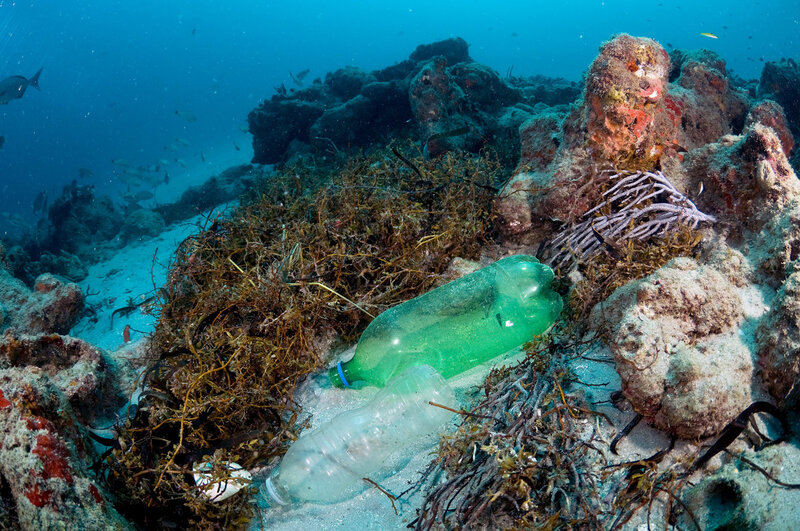 |
| Two plastic bottles in a coral reef |
It is said that millions of tons of plastic waste end up in the ocean every year and stays there. But a recent four-year study has found that 159 coral reefs in the Pacific, namely Australia, Burma, Indonesia, and Thailand, are heavily polluted with plastic. It adheres to the coral, particularly branching coral. And when it adheres, it sickens or kills the coral. According to Dr. Drew Harvell of Cornell University, there are two ways plastic could be harming coral: One way is that there are bacteria and other destructive microorganisms on the corals and when the coral is scraped, that might bring pathogens into the coral. The second way that plastic can obstruct sunlight from reaching coral. In addition, Dr. Harvell's group found heightened risk of four diseases in coral in connection with plastic. The study showed that plastic, particularly in Asian waters, came in a variety of forms such as bottles, diapers, food wrappers, and cotton swabs. Furthermore, the coral that had plastic did not appear healthy. The researchers believe that over 11 billion plastic items could be tangled in coral reefs of the Asia-Pacific region. However, their survey did not include China which is one of the largest sources of plastic pollution. While coral reefs in Australia were found to have minimum amount of plastic due to a more extensive waste control system, other countries do not have much control over what ends up in the ocean. Matthew Savoca, a marine scientist from University of California, Davis, who specializes in studying the effects of plastic in the ocean, indicated that ocean waters with tons of plastic waste might also carry other contaminants that could also be contributing to growing rates of coral disease. But Joleah Lamb, one of the researchers of the survey, stated that corals with plastic were much more inclined to be diseased. It is unclear how the plastic is causing disease, but the number of plastic getting into the oceans is increasing.
 |
| Coral reef littered with plastic |
I find it very disturbing that vast amount of plastic is ending up in oceans and in some parts, destroying the coral reefs. It clearly highlights that pollution, in general, is not being given full attention on a global scale. While some countries like Australia are taking comprehensive measurements to ensure that coral reefs are not tremendously affected by plastic pollution, others like China, Burma, and Thailand do not have much recycling and have dumps located either next to the ocean or waterways that run into the ocean. This explains why coral reefs of such countries are found to contain higher concentrations of plastic and that their waters are most polluted. The public needs to really step up to take comprehensive measurements to combat pollution in any form. Plastic alone is not the only harmful pollutant that is destroying the world's coral reefs and other ecosystems. It was recently reported that lab waste was allegedly dumped in the IIT Madras campus. Even though the institution denies having done such a thing saying that the photos of the lab waste are old, it is still no excuse that such harmful material was carelessly dumped in a place which is surrounded by forests and its inhabitants. The presence of lab waste which includes toxic chemicals can endanger the wildlife which many people see on the IIT Madras campus and is a clear sign of environmental neglect. I really think the public should change its mindset about managing various types of waste material and properly dispose them. Furthermore, all the governments should implement policies directed at suppressing any type of pollution. Just recently, the Environmental Protection Agency (EPA) has ended the Clean Air Act under the Trump administration much to the relief of fossil fuel companies. This will result in more pollution and it clearly shows that the federal government is not in good terms with the environmental groups and governments of other countries who are very big on the well-being of the global environment. I believe it is highly crucial that the world needs to come together as a one big community in order to put an end to pollution on a global scale. Staying hostile to one another because of difference in opinions related to the world environment will not make any difference. It is essential that the international public should never turn a blind eye on pollution and act upon the matter.
View article here
No comments:
Post a Comment